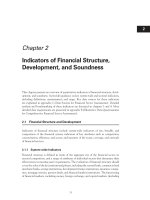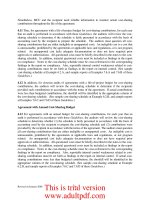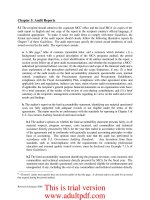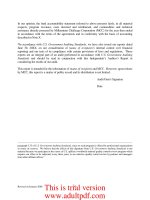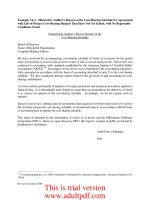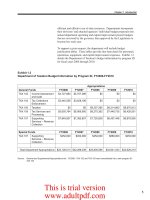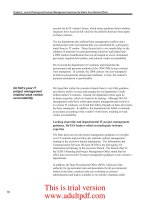Chapter 2 Foundations of Marketing
Bạn đang xem bản rút gọn của tài liệu. Xem và tải ngay bản đầy đủ của tài liệu tại đây (196.78 KB, 41 trang )
Chapter 2: Marketing Research and
Information Systems
Ms. DANG THI MAI HUONG (SARAH)
Faculty of Economics and Management
International School of Thai Nguyen University
Email:
•
•
•
•
•
•
Topic Outline
Assessing Marketing Information Needs
Developing Marketing Information
Marketing Research
Analyzing Marketing Information
Distributing and Using Marketing Information
Other Marketing Information Considerations
Marketing Information and Customer
Insights
Customer Insights are:
• Fresh and deep insights into customers needs
and wants
• Difficult to obtain
– Not obvious
– Customer’s unsure of their behavior
• Not derived from more information but better
information and more effective use of existing
information
Customer Insights
• Companies are forming customer insights teams
– Include all company functional areas
– Use insights to create more value for their
customers
– Customer controlled could be a problem
Marketing Information Systems (MIS)
Marketing information system (MIS) is a framework
for the day-to-day management and structuring
of information gathered regularly from sources
both inside and outside an organization.
Assessing Marketing Information Needs
MIS provides information to the company ’ s
marketing and other managers and external
partners such as suppliers, resellers, and
marketing service agencies
• FedEx, for example, has developed interactive
marketing systems to provide instantaneous
communication between the company and its
customers. Through use of the telephone and
Internet, customers can track their packages and
receive immediate feedback concerning delivery.
The company’s website provides valuable
information about customer usage, and it allows
customers to express directly what they think about
company
services.
The
evolving
telecommunications and computer technology is
allowing marketing information systems to cultivate
one-to-one relationships with customers.
Assessing Marketing Information
Needs
Characteristics of a Good MIS
• Balancing what the information users would like to
have against what they need and what is feasible
to offer
User’s
Needs
MIS
Offerings
Developing Marketing Information
Marketers obtain information from
Internal data
Marketing intelligence
Marketing research
Developing Marketing Information
Internal Data
Internal databases are electronic collections of
consumer and market information obtained from
data sources within the company network
Marketing Intelligence
Marketing intelligence is the systematic
collection and analysis of publicly available
information about consumers, competitors, and
developments in the marketplace
Marketing on the Internet
• Electronic commerce (or e-commerce) business
exchanges conducted over the Internet using
telecommunications tools such as web pages,email, and instant/text messaging.
• Electronic marketing (or e-marketing) The
strategic process of creating, distributing,
promoting, and pricing products for targeted
customers in the virtual environment of the
Internet.
• Blogs Web-based journals in which people can
editorialize and interact with other Internet users.
• Wikis Software that create an interface that
enables users to add or edit the content of some
types of websites (also called wikis or wikipages).
Marketing Research
• Marketing research is the systematic design,
collection, interpretation, and reporting of
information to help marketers solve specific
marketing problem or take advantage of
marketing opportunities.
• The purpose of marketing research is to inform
an organization about customers’ needs and
desires, marketing opportunities for particular
goods and services, and changing attitudes and
purchase patterns of customers. Market
information increases marketers’ ability to
respond to customer needs, which leads to
improved organizational performance.
The Marketing Research Process
Locating and Defining Research
Issues or Problems
• The first step in launching a research study is
issue or problem definition, which focuses on
uncovering the nature and boundaries of a
situation or question related to marketing strategy
or implementation
Designing the Research Project
Research design, an overall plan for obtaining the
information needed to address it.
This step requires formulating a hypothesis and
determining what type of research is most
appropriate for testing the hypothesis to ensure
that the results are reliable and valid.
Developing a Hypothesis
A hypothesis is an informed guess or assumption
about a certain problem or set of circumstances. It
is based on all the insight and knowledge available
about the problem or circumstances from previous
research studies and other sources.
Types of Research
+) Exploratory Research: When marketers need
more information about a problem or want to make
a tentative hypothesis more specific, they may
conduct exploratory research.
The main purpose of exploratory research is to
better understand a problem or situation and/or to
help identify additional data needs or decision
alternatives.
• If marketers need to understand the
characteristics of certain phenomena to solve a
particular problem, descriptive research can aid
them. Such studies may range from general
surveys of customers’ education, occupation, or
age to specific surveys on how often teenagers
eat at fast-food restaurants after school or how
often customers buy new pairs of athletic shoes.
• For example, if Nike and Reebok want to target
more young women, they might ask 15- to 35year-old females how often they work out, how
frequently they wear athletic shoes for casual
use, and how many pairs of athletic shoes they
buy in a year.
•
Experimental research allows marketers to
make causal deductions about relationships. Such
experimentation requires that an independent
variable (one not influenced by or dependent on
other variables) be manipulated and the resulting
changes in a dependent variable (one contingent
on, or restricted to, one value or set of values
assumed by the independent variable) be
measured.
Marketing Research
Defining the Problem and Research Objectives
Exploratory research
Descriptive research
Causal research
